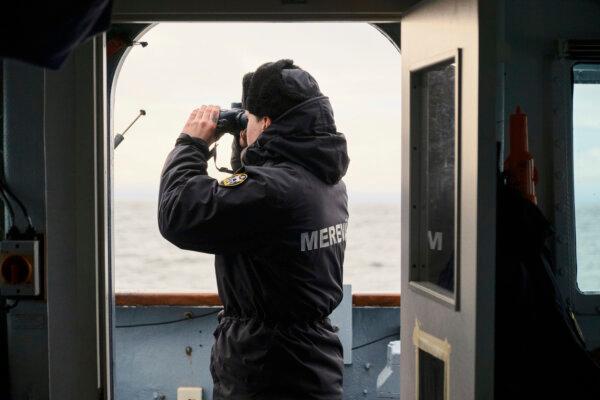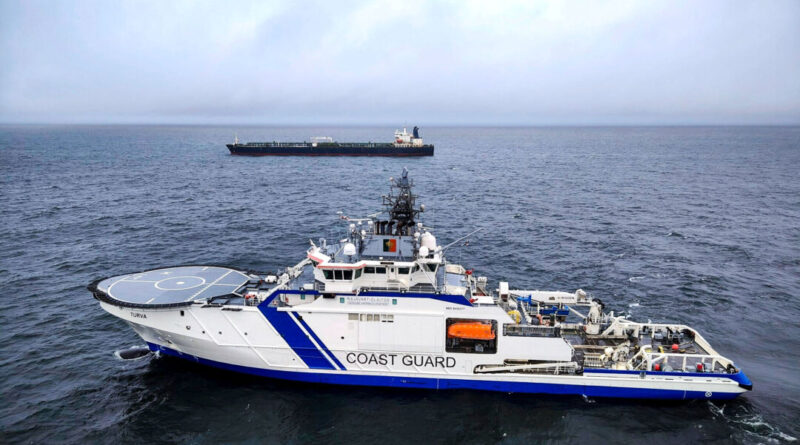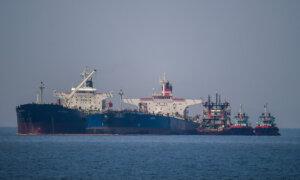Understanding Russia’s Covert Shipping Network: Its Operation and Challenges in Regulation
Enveloped in a perplexing mix of aliases, these vessels operate openly and utilize international shipping lanes.
News Analysis
Russia has been expanding its so-called shadow shipping fleet for several years, but concerns have intensified in recent months following links to various incidents involving undersea infrastructure.
In December, Germany, Britain, and ten other European nations reached an agreement on measures intended to “disrupt and deter” Russia’s shadow fleet.
So, what exactly is the shadow fleet, why is it necessary for Russia, and is it possible to disrupt it without transgressing international maritime laws?
Neil Roberts, head of Marine & Aviation at Lloyd’s Market Association, indicated that Russia may have control over approximately 1,100 ships—a combination of oil tankers, bulk carriers, and container ships—labeling the term “shadow fleet” as somewhat misleading.
4 Types of Fleet
He explained to The Epoch Times that there are four fleet categories. “The Western-administered A1 fleet adheres to all necessary insurance and controls. Next is a parallel fleet, managed by countries like China and India, which is well-maintained but does not comply with sanctions.”
“Next is the ‘gray fleet’, which comprises vessels utilized for illegal drug and arm smuggling. Finally, there is the Russian fleet, which has a blend of reasonably maintained ships alongside older vessels,” Roberts elaborated.
The term “shadow” implies secrecy; however, Roberts emphasizes that these vessels operate openly and navigate international shipping lanes, including the Suez Canal.
These ships, often masquerading under a tangled web of aliases, have traversed international waters long before Russia’s invasion of Ukraine in February 2022. However, the war and intensified NATO tensions have thrust them into the spotlight.
The shadow fleet is not only suspected of breaching sanctions; some of its ships are alleged to have interfered with undersea infrastructure, posing fears of marine pollution due to their questionable condition.
The next day, the Estonian Navy was summoned to safeguard the Estlink-1 cable, while the European Union’s foreign policy chief Kaja Kallas condemned the Eagle S incident as “the latest in a series of suspected attacks on critical infrastructure.”
In the past month, the governments of Britain, Denmark, Sweden, Poland, Finland, and Estonia announced plans to scrutinize the insurance documents of vessels navigating the English Channel, Gulf of Finland, and Kattegat—the strait separating Denmark and Sweden.
Estonian Prime Minister Kristen Michal remarked, “If vessels do not cooperate, we will escalate our actions. They will be added to a prohibition list or boarded in specific areas.”
Roberts raised concerns about the legality of these measures, noting, “This may be a moot point during a conflict, but we aren’t in a declared conflict.”
Historically, during World War II, Allied forces often boarded or seized German, Japanese, and Italian commercial ships—or even sunk them. However, in the present scenario, only Russia and Ukraine are at war, leaving third parties without a “declared conflict” that would authorize such actions.
The 1857 Copenhagen Treaty clearly states that no vessel is to be halted while traversing the straits between Denmark and Sweden—a rule strictly followed throughout the Cold War when Soviet submarines and battleships regularly made the journey.
According to Roberts, a significant concern for the Western shipping industry involves the ramifications if a shadow vessel collides with another ship or instigates a major pollution incident.
Lloyd’s of London stands as one of the world’s largest shipping insurance markets, with the Lloyd’s Market Association serving 55 managing agents that insure a combined total of £52.6 billion ($64.2 billion) worth of shipping and related assets.
Roberts noted, “The pressing question is: ‘What if an insured vessel collides with a sanctioned one?’”
Shadow fleet vessels frequently operate under ambiguous ownership structures and insurance arrangements that facilitate evading detection and sanctions.
However, Roberts clarified that while these ships may require higher-grade insurance to access Western ports, all that’s necessary to traverse international waters is protection and indemnity insurance, commonly referred to as P&I.
‘Bankroll His Illegal War’
In its announcement on January 6, the British government disclosed that it had now sanctioned over 100 Russian ships, including 93 oil tankers that “Putin has been leveraging to mitigate the effects of sanctions and finance his unlawful war in Ukraine.”
Included in this sanction were the tankers Ocean Faye, Andaman Skies, and Mianzimu, all of which are claimed to have transported over four million barrels of Russian oil in 2024.
The UK’s Ministry of Defence (MOD) announced that the new initiative, dubbed Nordic Warden, was activated last week.
According to the MOD, Nordic Warden “leverages AI to analyze data from diverse sources, including the Automatic Identification System (AIS) utilized by ships to communicate their positions, to assess the risks posed by each vessel entering sensitive areas.”
The statement continued, “Specific vessels identified as part of Russia’s shadow fleet have been entered into the system for enhanced monitoring as they approach areas of heightened significance.”
Furthermore, the MOD explained, “Should any potential risk be identified, the system will track the suspicious vessel in real-time and promptly issue a warning to be shared with JEF member states and NATO allies.”
The JEF’s operational headquarters in Northwood, situated on the outskirts of London, is currently overseeing 22 areas of interest, including the English Channel, the North Sea, the Baltic Sea, and the Kattegat.
Roberts indicated that “a significant amount of spoofing is taking place, with vessels claiming to be in one location while actually being in another. This is particularly prevalent in the eastern Mediterranean and the Black Sea.”
A legal framework governing the world’s oceans, known as the United Nations Convention on the Law of the Sea (UNCLOS), was adopted in 1982 and became effective in 1994.

A sailor keeps watch on an Estonian naval ship patrolling in the Baltic Sea on Jan. 9, 2025. Hendrik Osula/AP
He noted, “There exists no ‘right of innocent passage’ for foreign vessels in a nation’s lakes, canals, rivers, or ports; permission is required prior to entry.”
“Territorial waters grant full sovereignty up to 12 nautical miles. Beyond that, in the contiguous zone, intervention may occur if there’s been an offense committed within territorial waters,” Roberts clarified.
“Following that is the exclusive economic zone (EEZ), where a country can utilize and exploit marine resources, extending up to 200 nautical miles from its coastline,” he added.
“Further out is the continental shelf, which is not available to all countries, extending up to 350 miles, with the high seas lying beyond that,” he explained.
“Outside 12 nautical miles, sovereign power is limited. Unjustified boarding of vessels in international waters would be seen as an antagonistic act toward the countries whose flags those vessels carry,” he warned.
Roberts asserted that shadow fleet vessels do not all share the same flag.
“They operate under a variety of flags, making it likely that multiple nations would be offended unless proper negotiations or justification are established,” he said.
The consortium of ten countries attempting to “disrupt and deter” Russia’s shadow fleet will face challenges in proving that these vessels are not participating in “innocent passage.”
“Establishing that is quite complex,” Roberts remarked.
There’s also a potential risk that Russia might retaliate by boarding Western vessels in areas such as the Black Sea or the White Sea, north of Murmansk.
Roberts expressed doubt about the effectiveness of sanctions against Russia in light of its trading partnerships with China.
“There’s a Western initiative to demonstrate support for Ukraine… and sanctions have been chosen as a method of that support. It was assumed they would wield greater effect than they actually have,” he noted.
He referred to President Woodrow Wilson’s 1919 proposition of economic sanctions, based on the idea that such measures should be “more severe than war.”
However, Roberts emphasized, “Effective sanctions require broad international backing. This is where the strategy falters: not all nations are aligned.”
The Associated Press and Reuters contributed to this report.





